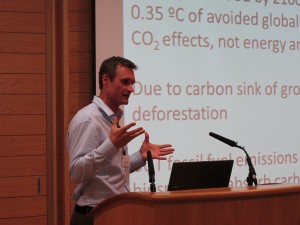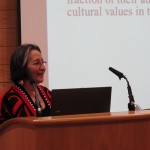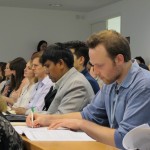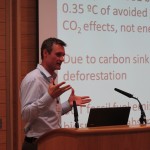By: Dr. Heike Schroeder
Senior Lecturer in Climate Change and International Development
School of International Development
University of East Anglia, Norwich
Deforestation of tropical, old-growth forests in least developed to rapidly developing countries in the Global South is a topic that is receiving unprecedented attention. The challenge is clear: deforestation is adding significantly to atmospheric greenhouse gas concentrations (13-17% of global emissions). Deforestation rates are highest in the poorest countries and deforestation is a major path to development for these countries — as it was for developed countries centuries earlier. While developing countries cannot be obligated under existing international law to stop deforesting, they could be compensated for not clearing their forests by developed countries, which have the responsibility and capability to pay. This is the original idea behind what has been termed “Reducing Emissions from Deforestation and Forest Degradation” with compensations also for forest conservation, enhancement of forest carbon stocks and sustainable forest management — REDD+.

A wide range of actors, interests and ideas have emerged to shape this process across international, national and local institutions and a cacophony of different initiatives, programmes and policy paradigms have ensued, all of which are in some way addressing the problem of deforestation. Much is at stake and many questions remain unanswered. How can such a funding mechanism be implemented effectively given the many governance challenges, including leakage, permanence, additionality, fair benefit sharing, tenure security and stakeholder participation in decision-making processes?In essence, how can justice and equity be ensured for a mechanism that permeates local, national and international levels of governance?
An APN-sponsored conference was held at St. Anne’s College, Oxford, on 23-24 March 2012, to discuss this question. It was co-organised by the University of East Anglia, the University of Oxford and the Tyndall Centre for Climate Change Research and brought together some 110 REDD+ experts from around the word to address the pressing concerns of REDD+ and its implications for poor people.
Themes included:
- National and social science framings of the problem of deforestation, presented by Dan Bebber (Earthwatch)/Yadvinder Malhi (University of Oxford) and Arun Agrawal (University of Michigan);
- Conceptualizing justice and equity in REDD+, presented by Kate Schreckenberg (University of Southampton) and Thomas Sikor (University of East Anglia); and
- Novel approaches to REDD+, presented by Rosita Worl (Sealaska) and Suneetha Subramian (UNU-IAS).
Toby Gardner (University of Cambridge), Tim Forsyth (LSE) and Bhaskar Vira (University of Cambridge) provided reports during the final plenary on these themes to draw out findings to conclude the conference. In addition to these plenary talks, some 40 paper presentations brought together a wealth of conceptual thinking and application through case studies from around the world.
What has emerged from discussions is that to get REDD+ right is to effectively coordinate and implement it across levels of governance — from international REDD+ rule making through national law making to local practice building. Challenges include:
- Communicating across knowledge traditions of natural versus social sciences and Western versus indigenous approaches;
- A clash of framings of deforestation and underlying agendas from carbon sequestration and commodification of carbon at the international level through economic development at the national level to forest conservation and traditional forest stewardship at the local level; and
- Transforming disjointed attempts at developing ‘safeguards’ and ‘co-benefits’ internationally into integrated and livelihood-enhancing objectives on the ground.
Conference outputs will include a special issue in a reputable academic journal and a multi-authored policy-relevant journal article. Video/audio recordings of all sessions, power point slides of most presentations and some papers are available on the conference website at http://www.eci.ox.ac.uk/redd/index.php.



